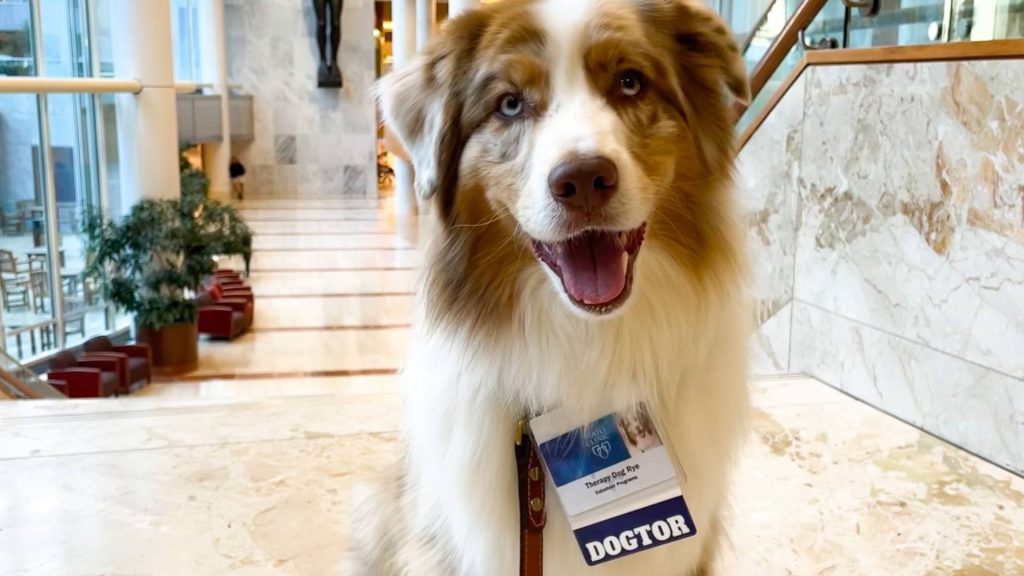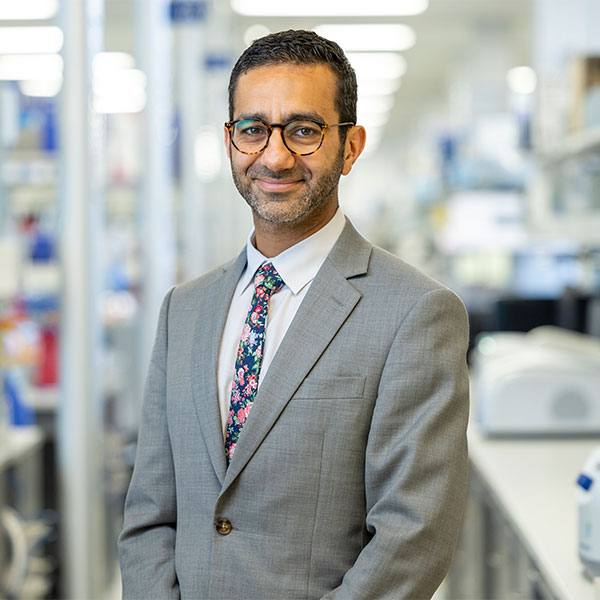
When Jules and Jason Hunter felt like they were losing their son Calvin to severe epilepsy that caused his motor and communication skills to decline, they turned to Mayo Clinic for a second opinion.
A doctor and a "dogtor" — as his nametag says — helped Calvin regain abilities and his smile.
Watch: 'Dogtor' and doctor return joy to boy with severe epilepsy
Journalists: Broadcast-quality video pkg (2:41) is in the downloads at the end of the post. Please courtesy: "Mayo Clinic News Network." Read the script.
"Right here is when you get the big Calvin smiles," Jules says, her own face alight watching 10-year-old Calvin doing tricks with a 6-year-old Australian shepherd named Rye.
Rye and his human handler, Lindsey Wallace, volunteer at the Rochester International Airport and at Mayo, where Calvin is seen for abnormal electrical brain activity while he sleeps.
"I always call it like a thunderstorm in his brain at night," Jules says.
Severe epilepsy activated during sleep
Globally, an estimated 5 million people are diagnosed with epilepsy each year, according to the World Health Organization. In the U.S., about 470,000 children have epilepsy, according to the Centers for Disease Control and Prevention.
Epilepsy has multiple subtypes. Calvin's is called developmental/epileptic encephalopathy with spike wave activation in sleep (DEE-SWAS). Affecting about 0.5% of children with epilepsy, DEE-SWAS is rare, according to the Epilepsy Foundation. DEE-SWAS typically starts in children between the ages of 2 and 12. Regression of skills or failure to gain new skills is the hallmark of DEE-SWAS, although children also may have seizures.

The Hunters were in an online support group for parents of children with epilepsy when someone mentioned Mayo Clinic. Jules found clinical research articles by Dr. Anthony Fine, a Mayo Clinic pediatric neurologist, who studies DEE-SWAS, which formerly was known as electrical status epilepticus during slow-wave sleep (ESES).
Forty-five minutes into their initial meeting with Dr. Fine in 2020, Jules was amazed. "He really took the time to understand what was going on with Calvin," she says.
Change in treatment plan
Initially, Calvin would barely speak during appointments. What could be attributed to shyness instead was related to Calvin's epilepsy causing a lack of awareness of things around him and difficulties with language, Dr. Fine explains.
While scientific literature on DEE-SWAS treatment is limited, Dr. Fine says failure to aggressively treat this severe epilepsy may result in permanent effects that negatively affect a child's development. Dr. Fine changed Calvin's treatment plan. Calvin began to slowly improve.
"Dr. Fine is incredible," Jules says. "I always say that he gave us our son back. (Calvin) was just kind of like a shadow of himself before we got here, and (Dr. Fine) has really helped to bring him along. He's Calvin now.
"(Dr. Fine) is really good. He doesn't make us feel like just a patient. I mean it's almost like he knows Calvin. He knows his personality now and what he's like. He finds ways to connect with Calvin. When we're here at appointments, we never feel rushed. He's genuinely invested in helping Calvin."
Over the years, Dr. Fine says, he's seen Calvin's personality emerge. "He has a great sense of humor, and he's kind of a little bit of a prankster," he says. "That's been really nice to see."
Animal-assisted support
Calvin and family travel regularly to Mayo from their home in southern Illinois. On their first trip through the Rochester airport, they spotted Lindsey and Rye doing tricks for other travelers. Soon, a meeting between Calvin and Rye was arranged.
Even Dr. Fine heard about it.
"Cal's usually quiet. He doesn't talk a ton," Dr. Fine says. "It was pretty impactful that he was excited and willing to share that experience. That's something that just a person interacting with him isn't going to do."
In addition to volunteering in the animal-assisted support programs at the airport and clinic, Lindsey is a physician assistant in the Mayo Clinic Medical ICU. Jules and Lindsey often align schedules so Calvin and Rye can meet.
With Lindsey's help, Calvin has learned to do tricks with Rye. One favorite has Rye walking between Calvin's legs. Paws step on top of shoes, and the two glide together. "Good boy," Lindsey says, and Calvin offers Rye a dog treat. As Calvin's coordination has improved, their trick repertoire has grown.
With DEE-SWAS, a patient may experience natural fluctuations of plateaus or regression. Dr. Fine says it's important to focus not just on Calvin's epilepsy but his overall care, optimizing learning and day-to-day functioning. "We are looking at the whole patient," Dr. Fine says.
Importantly, a supportive environment makes a difference. "That Calvin has something to look forward to, such as Rye and Lindsey, when he comes to Rochester, I think has made a significant impact on just the overall experience for him," says Dr. Fine.

Special visitor
When Calvin had to have his brain waves monitored overnight at Mayo Clinic Hospital — Rochester, Saint Marys Campus, a special visitor made a difference.
"I brought (Rye) in that evening, and it was amazing," Lindsey says. "Before you know it, by the end of the visit, Calvin had a huge smile on his face, like massive. Rye was laying in front of him, and Rye just had a huge smile on his face. The two of them were just absolutely lit up."
Jules sees the same "paws-itivty."
"(Calvin's) happier. You know, that's the most important thing to me. Before we didn't see these smiles a whole lot. And now we see them a lot. We see them all the time actually," says Jules. "And he has this dog friend as well now, which is a huge added bonus."
For information
Lindsey and Rye are a registered therapy dog team with Pet Partners, a nationwide program. Rye was honored by the program as Pet of the Year in 2023.
For more information on participating in animal-assisted support programs, contact:
Mayo Clinic: Caring Canines, volunteer.mayoclinic.org, MCVPAnimalActivities@mayo.edu, or 507-538-1407
Rochester International Airport: Caring Tails, flyRST.com/CaringTails or 507-282-2328
Related posts:
- Mayo Clinic Minute: Why kids with epilepsy need a seizure action plan
- Mayo Clinic Q and A: Advances in care for medication-resistant epilepsy
- Mayo Clinic Minute: Common myths about epilepsy and kids







